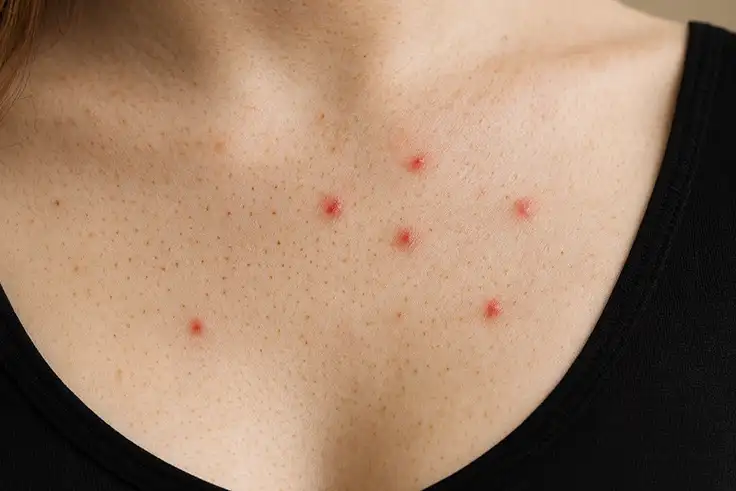What Causes Adult Acne?
Adult acne doesn’t happen without reason. One of the most common triggers of adult acne is excess oil production. Your skin produces oil (called sebum) naturally, but when it makes too much oil your pores can get clogged. Once that happens, acne breakouts almost become inevitable.
When pores are clogged, bacteria—specifically Cutibacterium acnes—begin to multiply. While this bacteria naturally lives on and in your skin, clogged pores create the perfect environment for it to grow, leading to inflammation and, eventually, serious acne. The immune system also plays a role by detecting the overgrowth of acne-causing bacteria and reacting with inflammation, which causes the redness and swelling on top of acne.
Hormonal fluctuations are another major factor, even in adulthood. Hormones like androgens (such as testosterone and DHEAS) can increase sebum oil production, which can cause pores to clog even more easily. This is particularly true for women during menstrual cycles, pregnancy, and menopause, when hormone levels tend to fluctuate wildly.
Polycystic Ovary Syndrome (PCOS), a common hormonal disorder, is often linked to severe and persistent adult acne due to elevated androgen levels.
Stress is another huge contributor to adult acne. If you’re stressed, your body releases cortisol, which ramps up oil production and makes acne breakouts likely. Stress also increases neuromodulators (like substance P), which stimulates oil production and worsens breakouts. On top of that, if you smoke cigarettes (Don’t, by the way!), you might find that your acne is more persistent and close to impossible clear up.
Heavy or comedogenic makeup, which clogs pores, can exacerbate your acne breakouts. Always try to buy non-comedogenic or oil-free options when choosing skincare or makeup products.
Psychological Impact of Adult Acne
Adult acne can have a significant emotional and psychological impact. Studies show that adult acne can cause higher levels of stress, anxiety, and even depression, with some people feeling more affected by acne in adulthood than during their teenage years, surprisingly enough. Individuals report that the social and emotional toll of acne can be severe, even when their breakouts are objectively mild.
Treatments for Adult Acne
Treating adult acne effectively depends on the severity of your breakouts. Luckily, there are a range of treatments available, from topical creams to oral medications, depending on how mild or severe your acne is.
Mild Acne Treatments
For mild acne, topical treatments are usually the first step, since they’re the least invasive. Benzoyl peroxide is a popular choice for reducing acne-causing bacteria and inflammation. It works by killing the bacteria that lead to acne and helping to clear out clogged pores. Another great option is topical retinoids, such as adapalene or tretinoin, which work by increasing cell turnover and preventing pores from getting clogged.
If your acne is both inflammatory and comedonal (blackheads or whiteheads), azelaic acid can be a powerful multitasker. Azelaic acid reduces inflammation, kills bacteria, and helps even out skin tone – a solid option for those with both acne and post-inflammatory pigmentation.
Moderate Acne Treatments
For moderate acne, you might need something stronger. Oral antibiotics like doxycycline or minocycline are often prescribed by doctors to reduce bacterial growth and calm inflammation. Try to limit prolonged use of antibiotics to avoid building up a much-needed resistance. Combining antibiotics with a topical retinoid can help treat both inflammatory and comedonal acne simultaneously.
For people with hormonal acne, particularly women, hormonal treatments like birth control pills or spironolactone can be incredibly effective. These treatments reduce androgen levels, which helps lower oil production and prevent breakouts.
Severe Acne Treatments
For severe acne, oral treatments like isotretinoin (commonly known by the brand name Accutane) are often the most effective option. Isotretinoin works by shrinking the oil glands, reducing oil production of sebum, and preventing pores from getting clogged. It’s considered the “last resort” because of its potentially serious side effects – dry skin and teratogenicity (harm to a developing fetus), so make sure your doctor monitors you if you are taking this sort of treatment.
References:





